ISAPP is your source for science-based resources, created and reviewed by experts in the field.
Looking for information you can trust on probiotics, prebiotics, synbiotics, postbiotics, fermented foods and more? Check out ISAPP’s resources for a wealth of accessible, reliable information specific to the field, and search according to the format or topic you need.
1-32 of 97 results
-
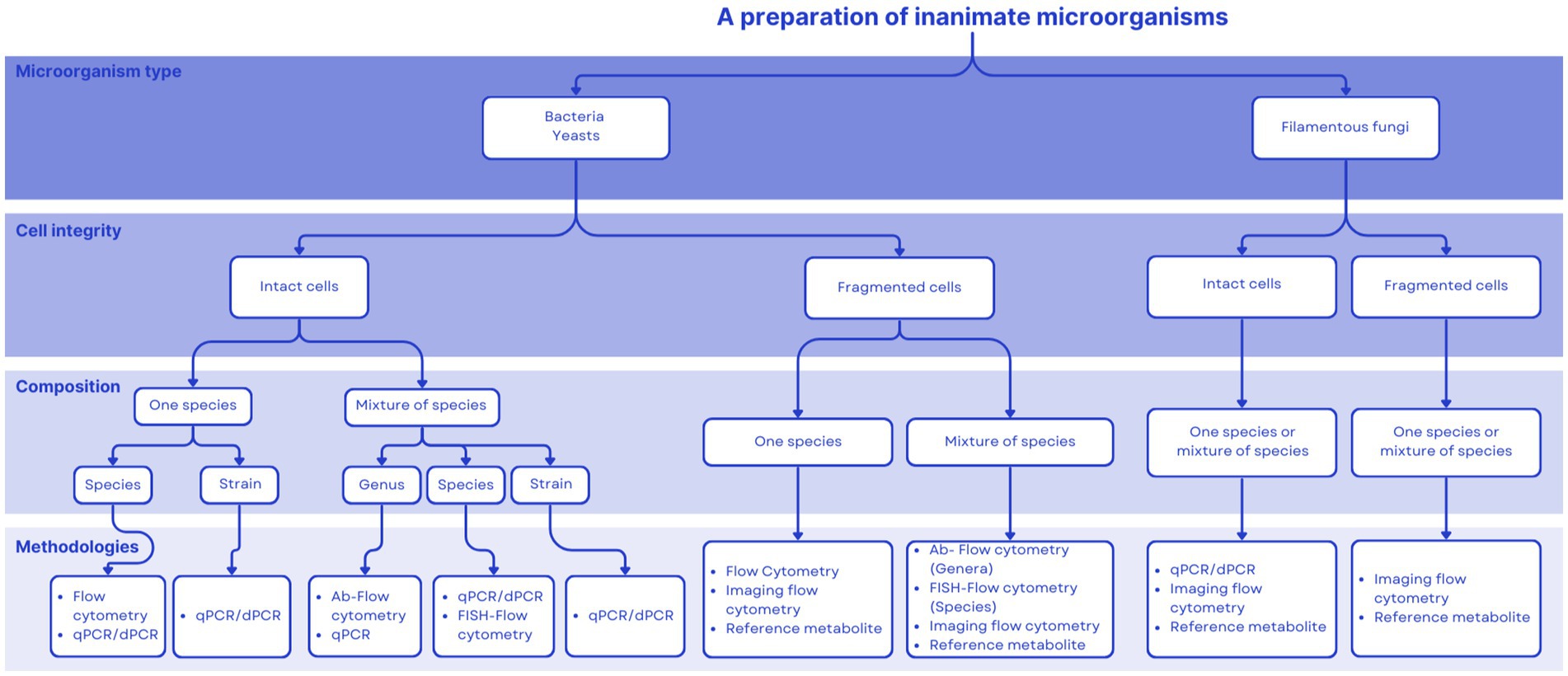
Postbiotics: a perspective on their quantification
Precise quantification is essential for measuring the dose of a postbiotic and ensuring consistency across scientific studies, but a gold standard for quantifying postbiotics does not yet exist. In this paper, 15 leading scientists from academia and industry offer globally relevant guidance for postbiotic quantification. The paper originated from a 2024 expert working group held… -
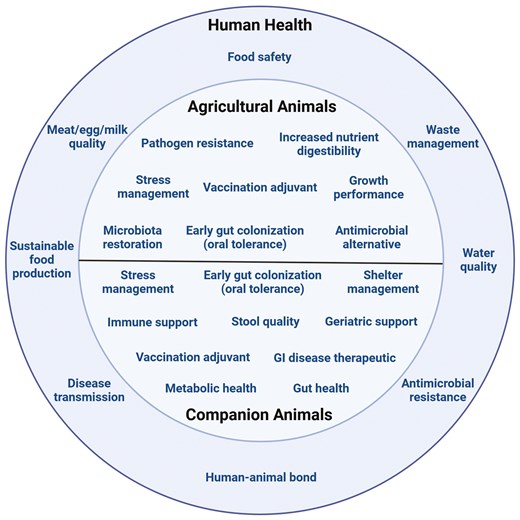
Use of biotics in animals: impact on nutrition, health, and food production
In this review, a group of animal health experts, comprising academic and industry scientists, surveyed the evidence on biotics for both agricultural and companion animals, outlining what’s known to date and the promising directions in this scientific field. Biotics are shown to be useful for helping maintain the health and wellness of various animal species…. -

Antibiotic-perturbed microbiota and the role of probiotics
In 2023, ISAPP convened an expert panel comprising academic experts in probiotics, clinical trials, microbiome science, microbiology and statistical methods to discuss what we know about the ability of probiotics to restore an antibiotic-perturbed microbiota. The topic was suggested by a member of the Industry Advisory Committee to clarify the state of research and highlight… -

Probiotics for preterms: sharing complex decision-making
This Clinical Outlook was published by 2 panelists from a session held at the ISAPP 2024 annual meeting, discussing the topic of probiotic use in preterm infants. The authors note that clinical practice varies widely, with family perspectives often overlooked in decisions about whether to use probiotics in preterm infants. The authors discuss the current… -

Design and reporting of prebiotic and probiotic clinical trials in the context of diet and the gut microbiome
Diet is frequently overlooked as a factor in probiotic and prebiotic studies, despite playing a key role in shaping both host gastrointestinal function and microbiota features known to have a significant influence on prebiotic and probiotic efficacy. A group of 8 international experts, led by Prof Maria Marco PhD and Prof Kevin Whelan PhD, explored… -

Classifying compounds as prebiotics – scientific perspectives and recommendations
Responding to industry member feedback on the need for clarity around scientific principles for assessing the prebiotic status of an ingredient, ISAPP published a paper on this topic in Nature Reviews Gastroenterology & Hepatology. The assembled team of experts addressed critical questions and challenges related to scientific substantiation of prebiotics, including characterization of selective utilization… -

Is There Evidence to Support Probiotic Use for Healthy People?
A publication output of an expert discussion group from the 2023 annual meeting addressed this question: What’s the state of evidence that probiotics are beneficial to healthy people at a population recommendation level? While many reviews address the value of probiotics for specific patient groups, this paper examined the strength of evidence for preventative use… -
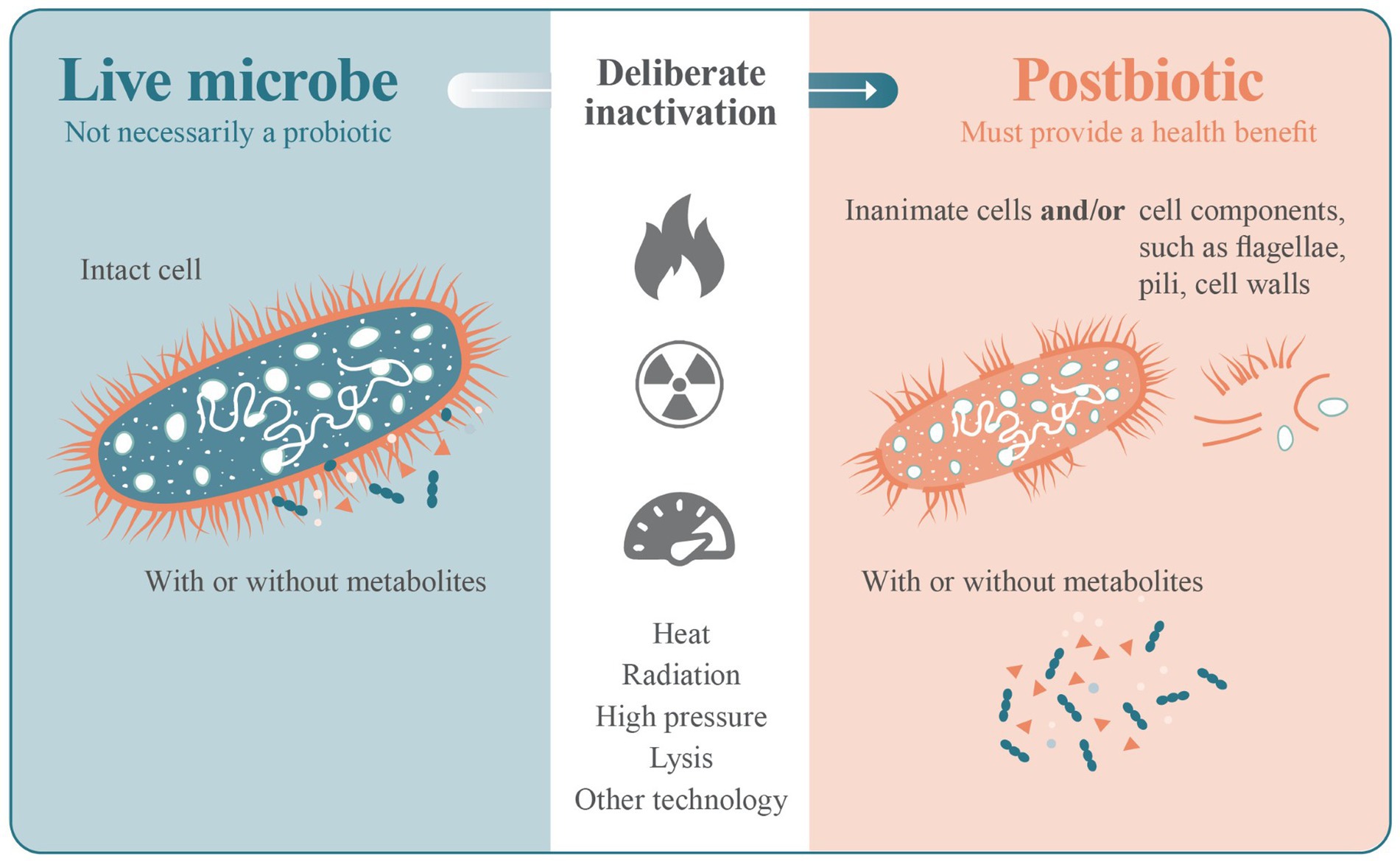
Frequently asked questions about the ISAPP postbiotic definition
This paper clarified the rationale, scope, wording, mechanism of action and commercial implementation of postbiotics, as well as expectations for safety, quality and efficacy data. -
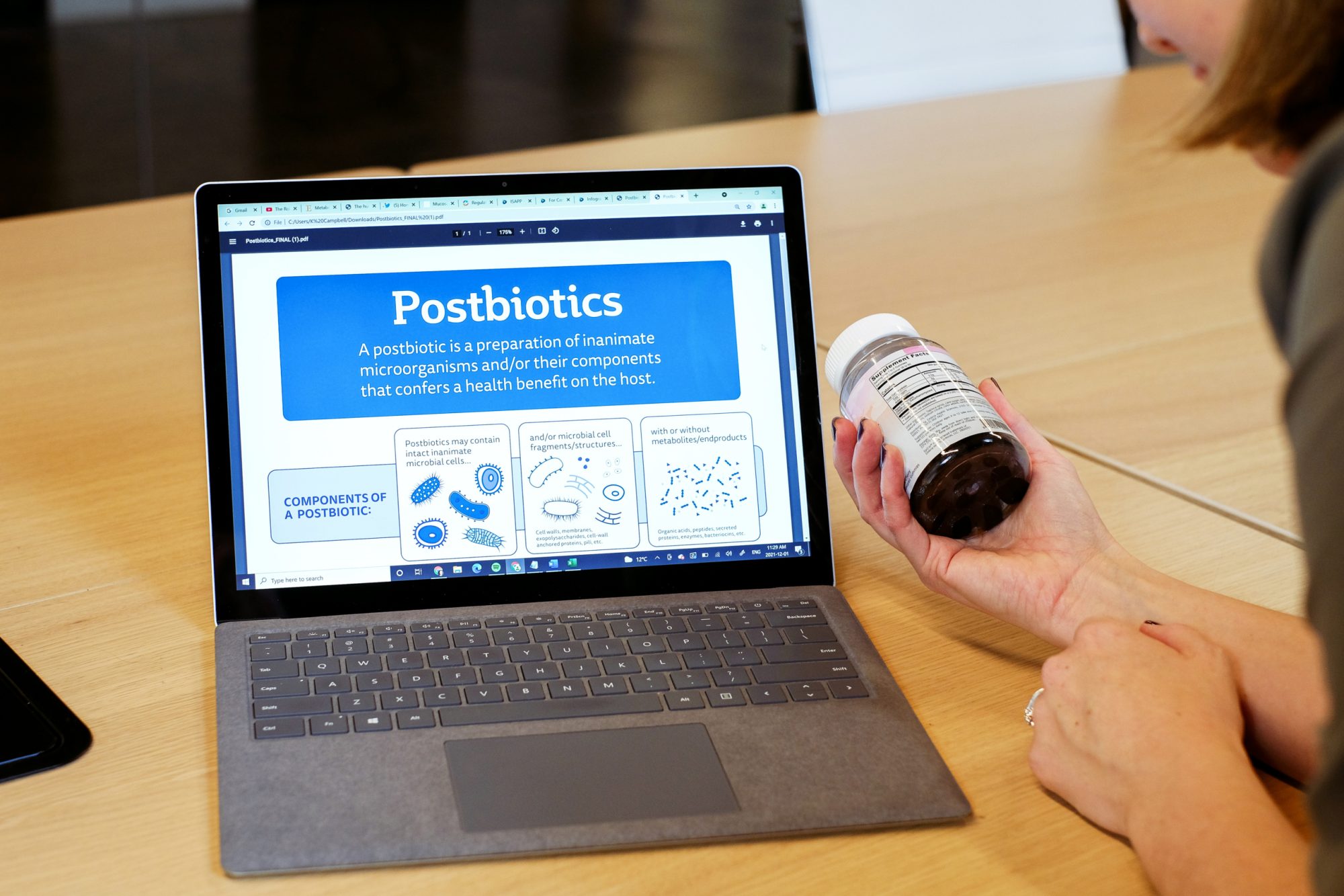
Postbiotics in the medical field under the perspective of the ISAPP definition: scientific, regulatory, and marketing considerations
With a focus on the European regulatory framework, the implications of the postbiotic concept for manufacturing standards, toxicology and safety studies, application to novel species and marketing considerations are examined. -

Probiotics in the Neonatal Intensive Care Unit—A Framework for Optimizing Product Standards
This paper, originating from an ISAPP discussion group on probiotic safety, outlines a path forward to proactively optimize the safety of probiotic products for the neonatal population involving collaboration between clinicians, pharmacies, and probiotic manufacturers and distributors. -

Fermented foods: a perspective on their role in delivering biotics
This article explores the intersection of fermented foods and biotics (including probiotics, prebiotics, synbiotics and postbiotics) — concepts that are frequently conflated. -
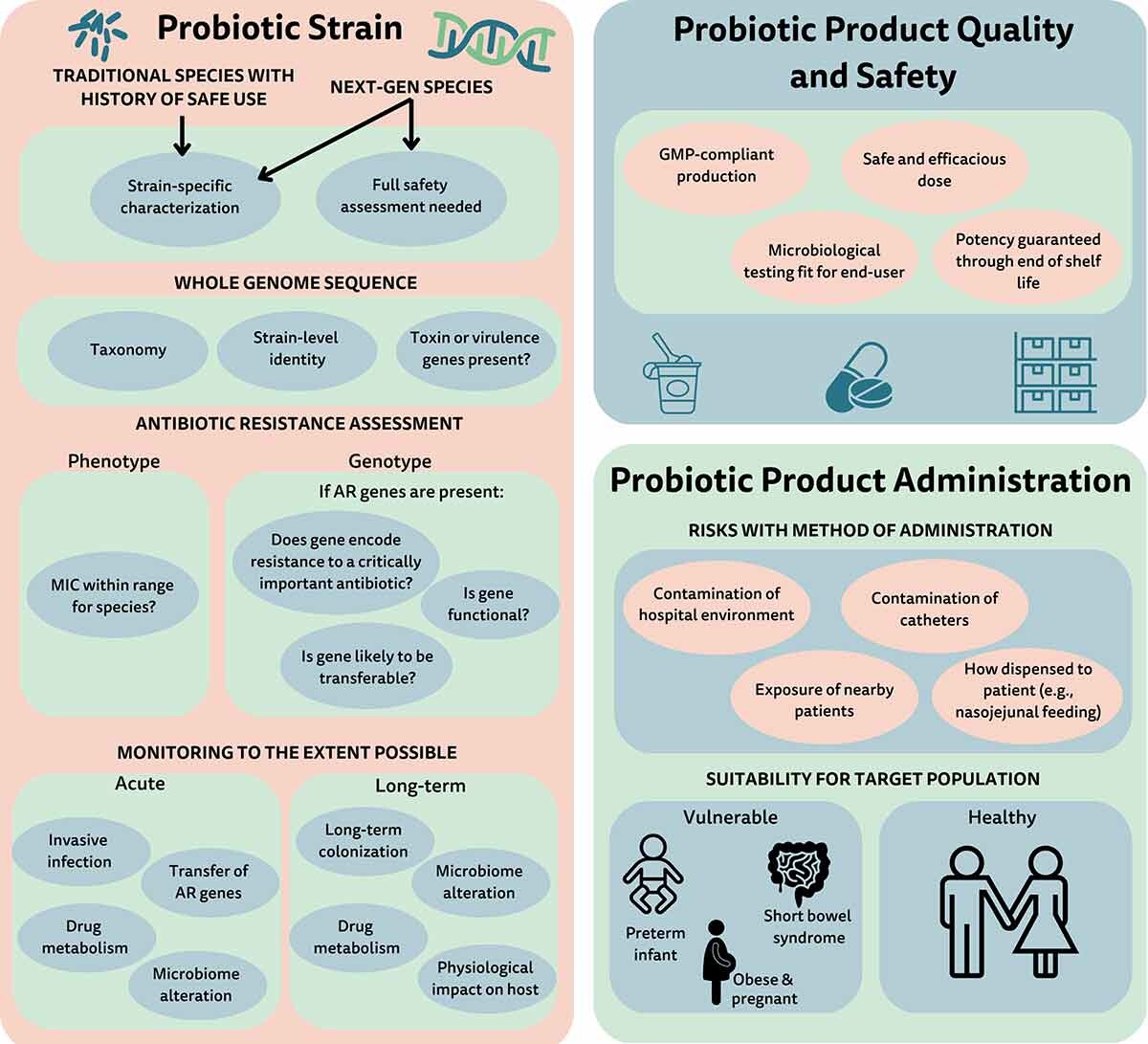
Emerging issues in probiotic safety: 2023 perspectives
This review provides a comprehensive list of potential probiotic risks, along with recommendations for assessing whether a given probiotic product is safe. -

Positive health outcomes associated with live microbe intake from foods, including fermented foods, assessed using NHANES database
This interrogation of a dietary database linked consumption of foods containing live microbes with several biomarkers of health. -

Commentary on: functional food science and gastrointestinal physiology and function
This commentary explores the relevance of gut microbiome science and posits that continued mechanistic research is needed to provide a rational basis for selecting probiotics and other biotics for use in functional foods. -
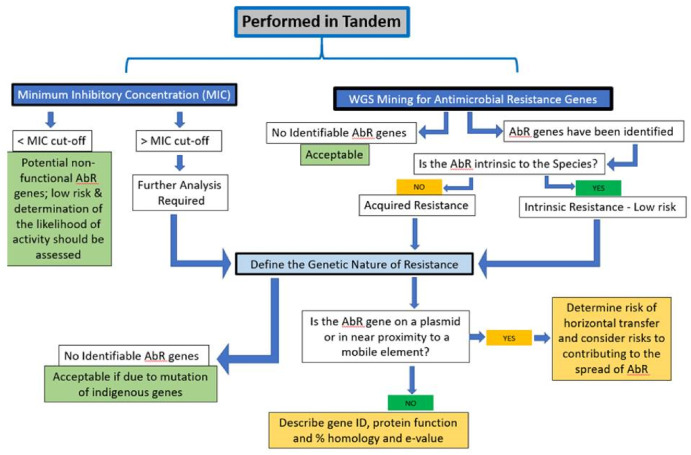
Considerations for determining safety of probiotics: A USP perspective
This review provides a summary guide to global regulatory guidelines and outlines the essential parameters of a comprehensive safety assessment for a probiotic product. -

Postbiotics: The concept and their use in healthy populations
This review follows up on the 2021 scientific consensus definition of postbiotics, and focuses on evidence for the use of postbiotics in healthy populations. -

A Classification System for Defining and Estimating Dietary Intake of Live Microbes in US Adults and Children
This paper estimated dietary intake of live microorganisms in US adults and children, using cross-sectional data from NHANES dietary database. The authors assigned foods an estimated level of live microbes per gram and estimated the percentage of individuals with low, medium and high intake. -
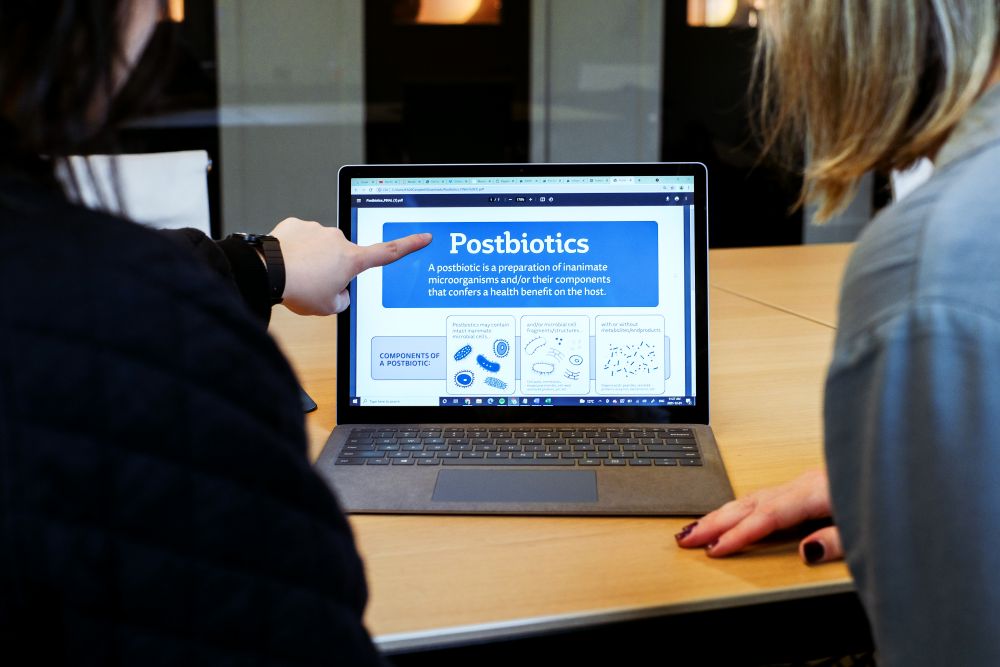
The Concept of Postbiotics
This article examines different definitions of postbiotics that have emerged in past years and provides justification for the ISAPP 2021 definition: “a preparation of inanimate microorganisms and/or their components that confers a health benefit on the host”. -
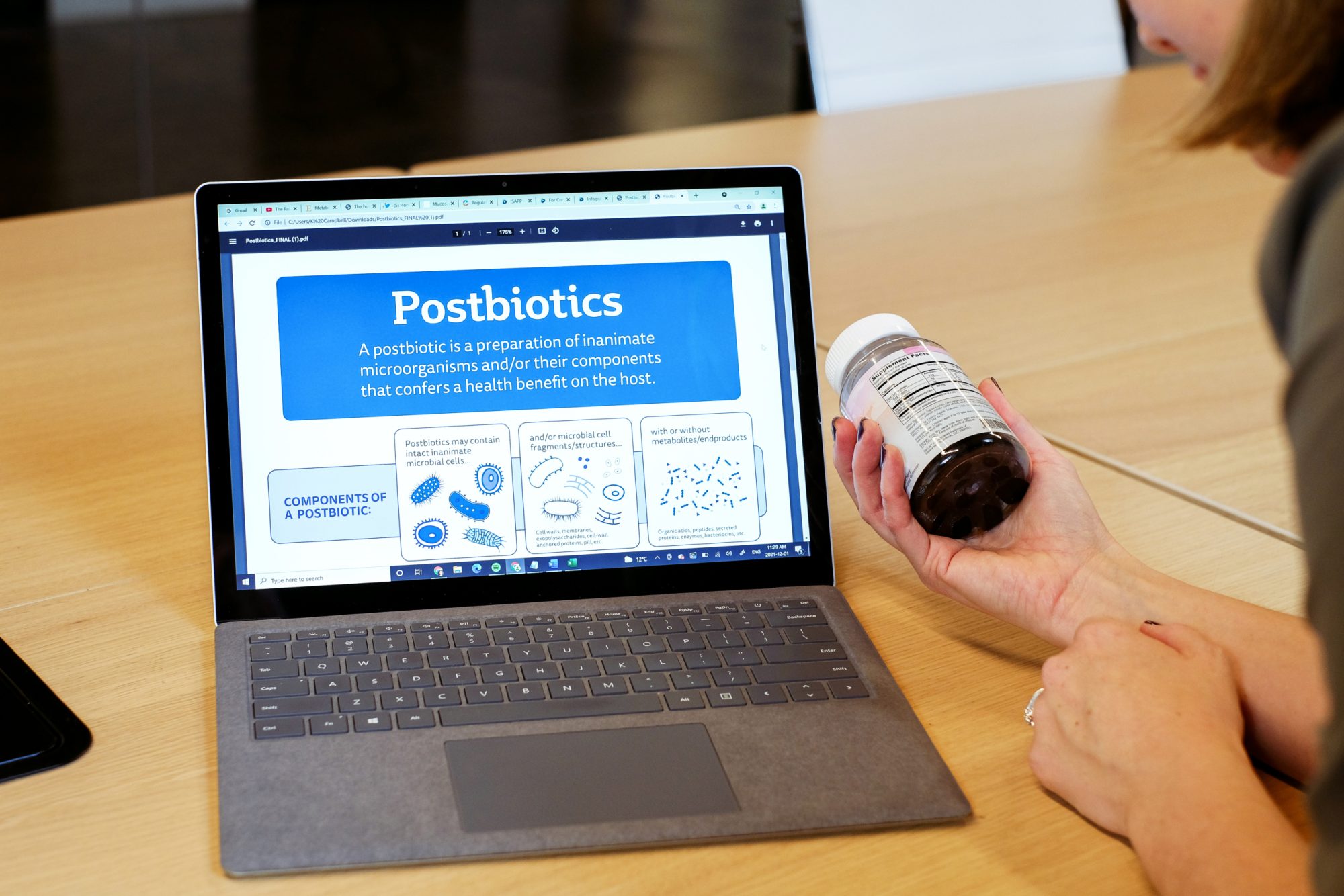
Reply to: Postbiotics — when simplification fails to clarify
This Correspondence addresses a response by Aguilar-Toalá et al. to the published ISAPP consensus statement on the definition and scope of postbiotics. The authors reinforce the arguments made in the original paper. -
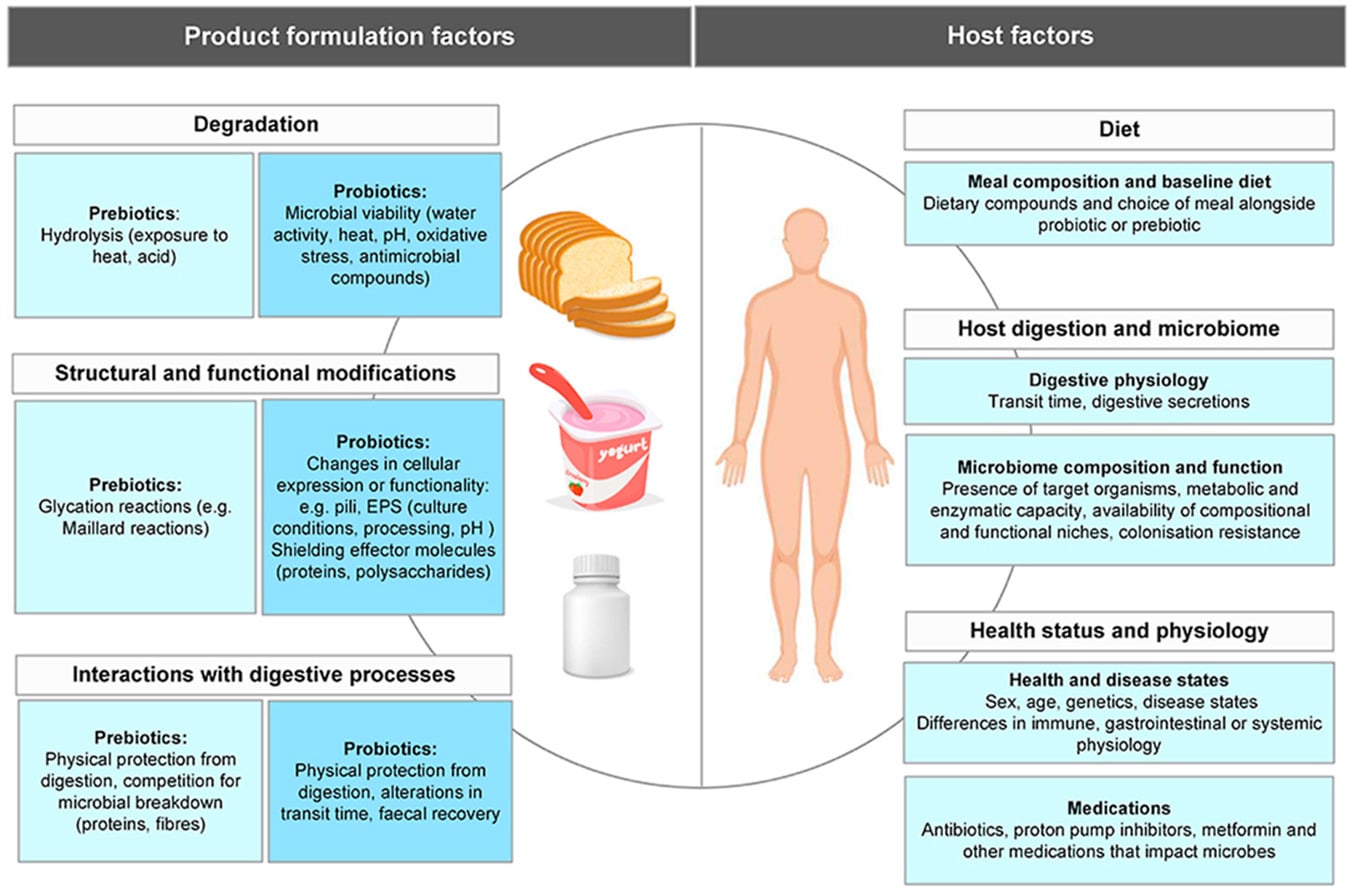
Applying probiotics and prebiotics in new delivery formats – is the clinical evidence transferable?
This paper addressed the evidence for whether delivery matrices independently alter the clinical effect of a given probiotic or prebiotic. -
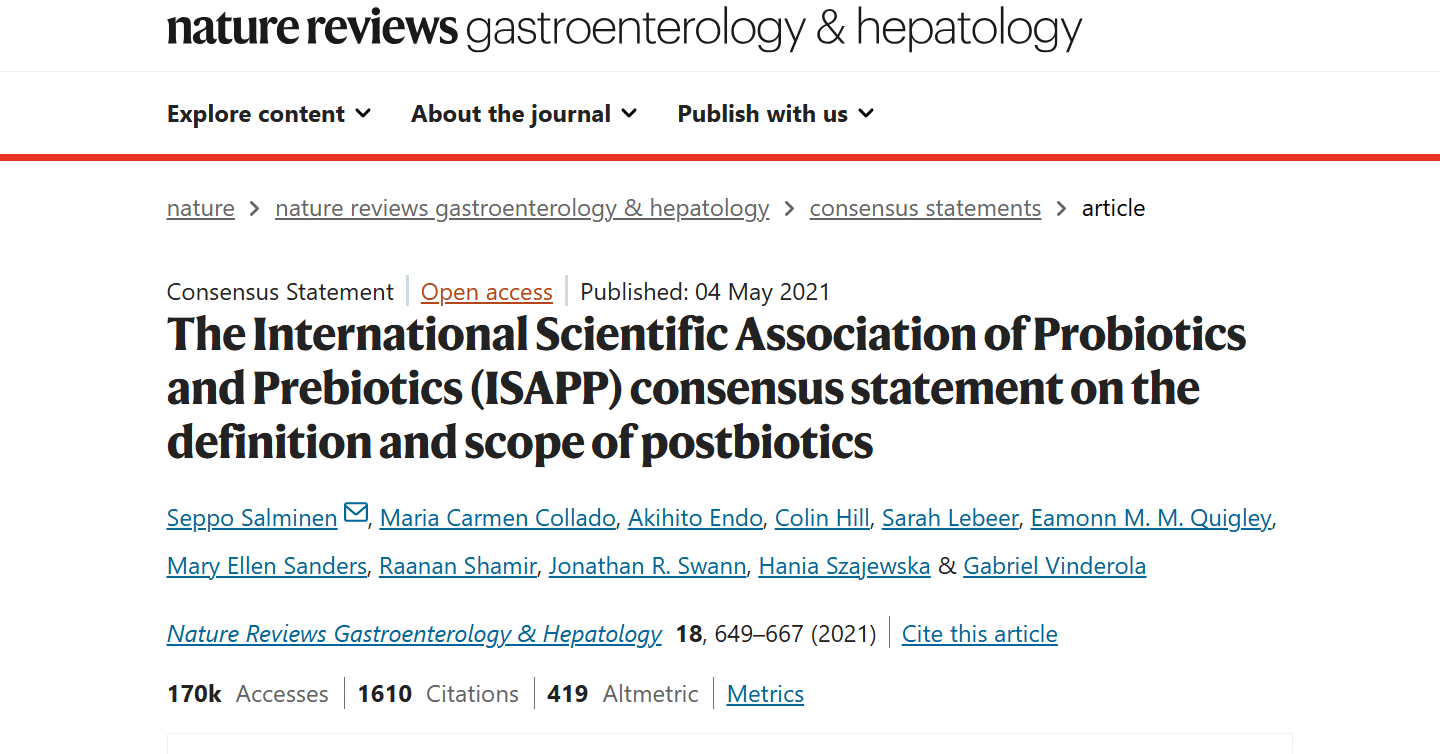
The International Scientific Association of Probiotics and Prebiotics (ISAPP) consensus statement on the definition and scope of postbiotics
This paper is the result of an ISAPP-led expert consensus panel discussion on the term ‘postbiotics’. The panel’s aims were to consider the scientific, commercial and regulatory parameters relevant to this term and to propose a clear, useful definition that supports future development of postbiotic products. -
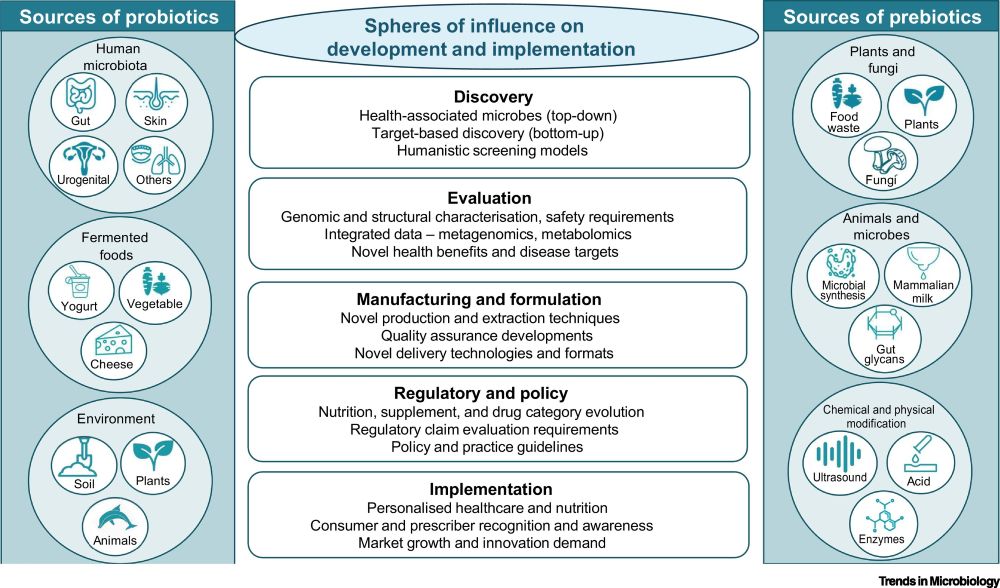
Shaping the Future of Probiotics and Prebiotics
This review covers emerging and anticipated trends in probiotic and prebiotic science. Developments in microbiome science are advancing probiotic and prebiotic research, expending the range of candidate probiotic strains and prebiotic substrates. -

The International Scientific Association for Probiotics and Prebiotics (ISAPP) consensus statement on fermented foods
An ISAPP-led panel of international experts defined fermented foods and beverages as “foods made through desired microbial growth and enzymatic conversions of food components”. -

Should There Be a Recommended Daily Intake of Microbes?
Evidence from various sources suggests beneficial effects from regular consumption of safe live microbes — also called live dietary microorganisms. In this ISAPP-led opinion article, authors propose assessment of the types and quality of the data available on microbe intake, and in particular the evaluation of evidence available from dietary databases. -

The International Scientific Association for Probiotics and Prebiotics (ISAPP) consensus statement on the definition and scope of synbiotics
In this expert consensus document, an ISAPP-led panel of international academic experts defined a synbiotic as “a mixture comprising live microorganisms and substrate(s) selectively utilized by host microorganisms that confers a health benefit on the host”. -
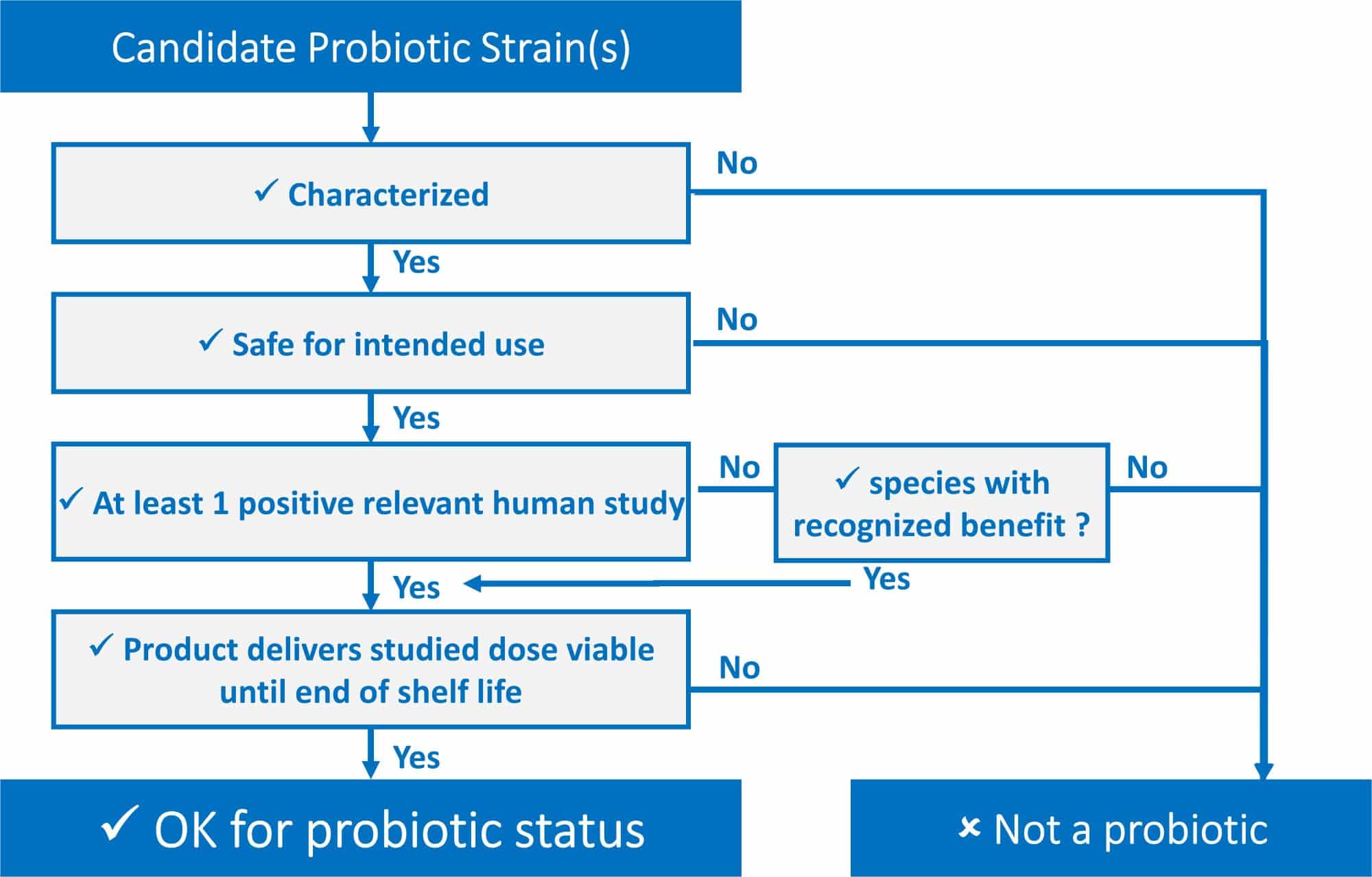
Criteria to qualify microorganisms as “probiotic” in foods and dietary supplements
The authors of this paper explain that the established scientific definition of probiotics can be translated into four criteria that determine whether specific strains of microorganisms qualify as a probiotic for use in foods and dietary supplements. The paper details how each of these four criteria may be assessed, and how they may lead to greater alignment and understanding across academia and industry. -
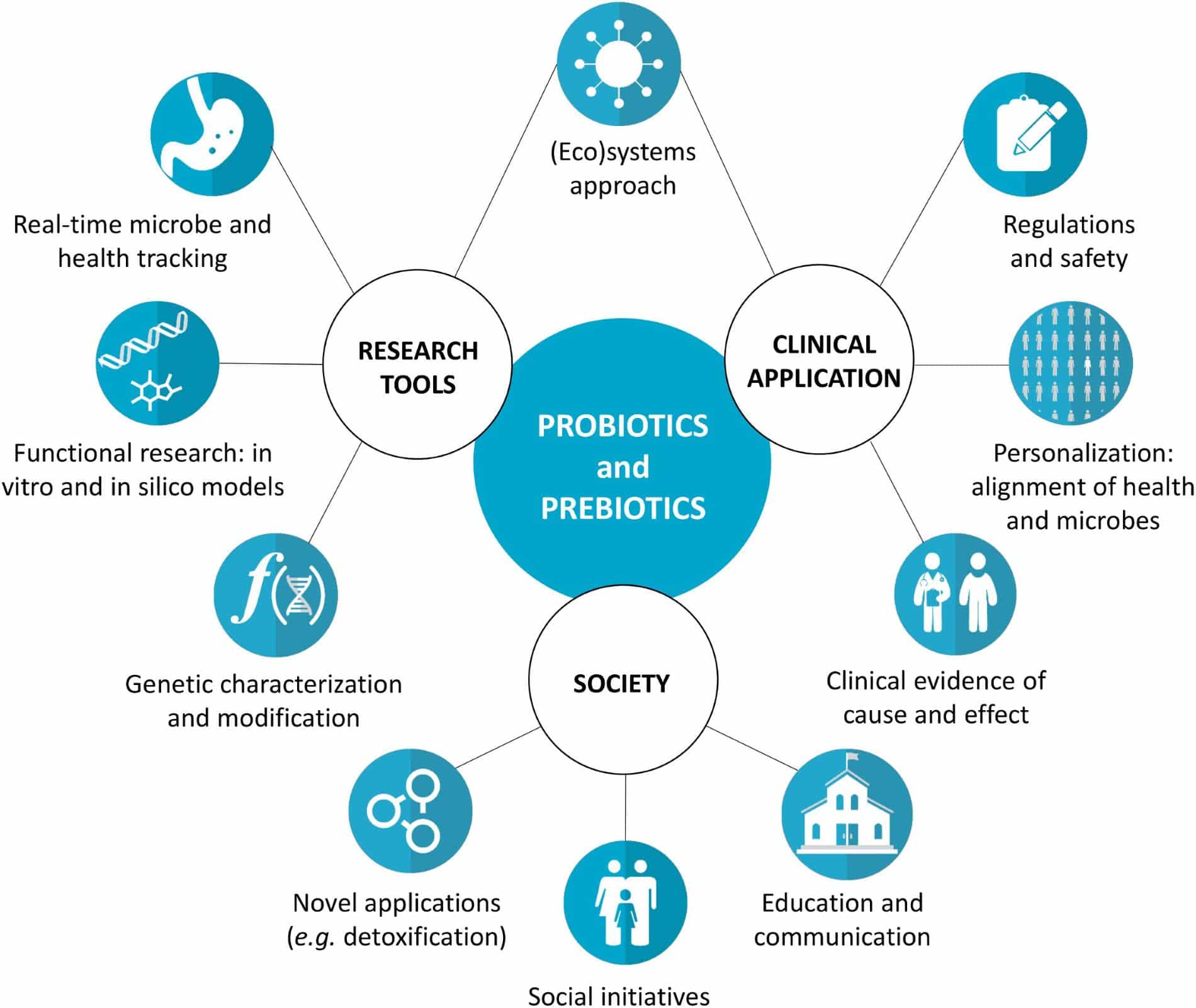
Future of Probiotics and Prebiotics and the Implications for Early Career Researchers
Early career researchers require new skillsets for driving probiotic and prebiotic innovation — skillsets that include genetic characterization and modification of strains, new in vitro, in vivo, and in silico techniques to uncover the effects of probiotics and prebiotics on their targets, and metabolomic analysis. -

Probiotics as a Tx resource in primary care
This Journal of Family Practice article gives a summary of the probiotics literature and a quick guide to evidence-based recommendations in primary care. The article includes points about safety, up-to-date practice recommendations by indication, and answers to nine questions about probiotics that are frequently asked by patients. -

Fermented foods in a global age: East meets West
Among the variety of fermented foods produced globally, many differences exist with respect to substrates and products and the microbes involved in their creation. This review discusses such differences and considers the influence of geography and industrialization on fermented food production. -

Probiotics and prebiotics in intestinal health and disease: from biology to the clinic
With recent increased interest in using probiotics and prebiotics to modulate the gut microbiota, this paper discusses gut-derived effects of probiotics and prebiotics in humans. Probiotic and prebiotic products must be shown to be effective in order to justify their use in the clinic. -

Developments in understanding and applying prebiotics in research and practice
Currently a limited number of ingredients have both the demonstrated mechanism of action and the defined health benefits that are required to meet the criteria for a prebiotic. Significant commercial interest exists, but additional research is needed to identify and commercialize prebiotics with unique health benefits. -

Improving End-User Trust in the Quality of Commercial Probiotic Products
In this review, authors recommend that probiotic companies engage in third-party evaluations to certify probiotic quality and label accuracy. The authors also cover the process of setting standards for identity, purity, and quantification of probiotics, as well as methodologies for quality assessment and relevant technical challenges.